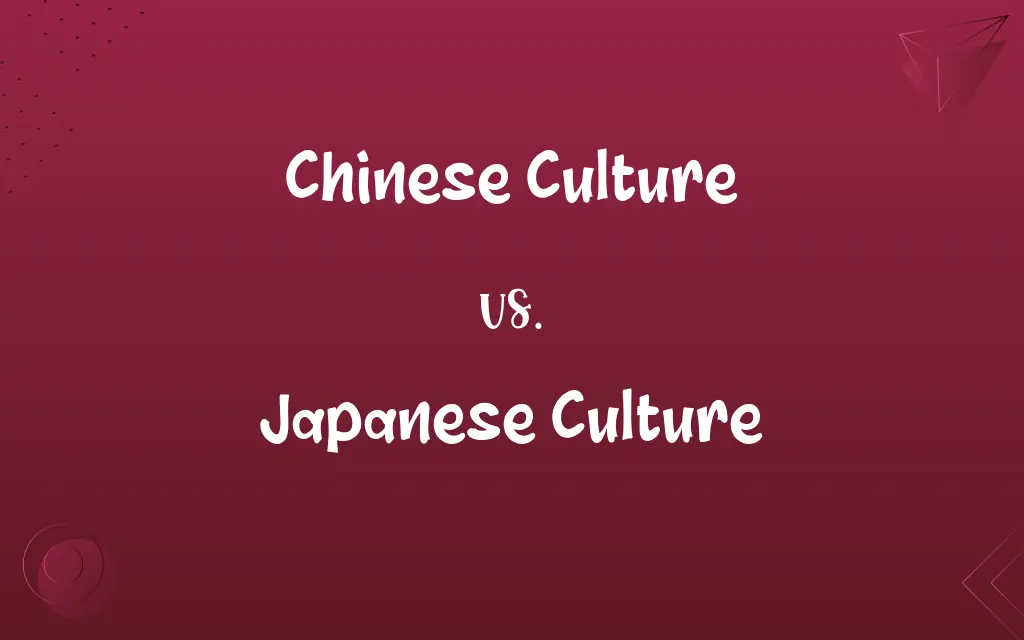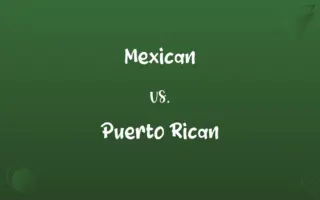Chinese Culture vs. Japanese Culture: Know the Difference

By Shumaila Saeed || Published on December 25, 2023
Chinese culture is rooted in Confucianism and historical continuity, focusing on community and tradition, whereas Japanese culture, influenced by Shinto and Buddhism, emphasizes harmony, respect, and modern adaptation.

Key Differences
Chinese culture, deeply influenced by Confucianism, emphasizes respect for authority, elders, and family, with a strong sense of community and societal roles. Japanese culture, while also valuing respect and community, is heavily shaped by Shinto and Buddhist philosophies, focusing more on harmony with nature and societal cleanliness and order.
Shumaila Saeed
Dec 25, 2023
In Chinese culture, art and literature have a long, continuous history, deeply intertwined with the nation's political and social evolution, often reflecting Confucian ideals. Japanese culture, while also rich in arts and literature, often reflects the aesthetic principles of 'wabi-sabi' (finding beauty in imperfection) and 'ma' (appreciation of space and silence), showcasing a unique blend of traditional and modern influences.
Shumaila Saeed
Dec 25, 2023
The Chinese language, with its complex characters and tones, is a crucial part of its culture, embodying the depth of Chinese history and philosophy. In contrast, the Japanese language, with its three distinct writing systems (Kanji, Hiragana, Katakana), reflects the amalgamation of native and foreign influences, mirroring Japan's ability to adapt and integrate external elements while maintaining its cultural uniqueness.
Shumaila Saeed
Dec 25, 2023
Chinese cuisine, known for its diverse flavors and regional varieties, often emphasizes communal eating and sharing, reflecting the culture's focus on family and community. Japanese cuisine, famous for its emphasis on seasonality, presentation, and fresh ingredients, mirrors the Japanese cultural emphasis on aesthetic and detail.
Shumaila Saeed
Dec 25, 2023
In social structure, Chinese culture traditionally emphasizes hierarchical relationships, guided by Confucian principles. Japanese culture, while also hierarchical, often stresses the importance of group harmony and consensus, influenced by its feudal and Shinto-Buddhist heritage.
Shumaila Saeed
Dec 25, 2023
ADVERTISEMENT
Comparison Chart
Philosophical Roots
Confucianism, emphasizing societal roles and family.
Shinto and Buddhism, focusing on nature and cleanliness.
Shumaila Saeed
Dec 25, 2023
Arts and Literature
Long history with political and social themes.
Blend of traditional and modern, with unique aesthetics.
Shumaila Saeed
Dec 25, 2023
Language
Complex characters and tones.
Combination of native and foreign elements.
Shumaila Saeed
Dec 25, 2023
Cuisine
Diverse flavors, communal eating.
Emphasis on seasonality, presentation, and freshness.
Shumaila Saeed
Dec 25, 2023
Social Structure
Hierarchical, based on Confucian principles.
Group harmony and consensus, with historical influences.
Shumaila Saeed
Dec 25, 2023
ADVERTISEMENT
Chinese Culture and Japanese Culture Definitions
Chinese Culture
Traditional practices and festivals rooted in ancient Chinese history and mythology.
The Dragon Boat Festival, part of Chinese culture, commemorates the poet Qu Yuan with dragon boat races.
Shumaila Saeed
Dec 04, 2023
Japanese Culture
A unique blend of traditional values and modern innovation, deeply influenced by Shinto and Buddhism.
The tea ceremony in Japanese culture reflects a blend of Zen Buddhist principles and a meticulous attention to detail.
Shumaila Saeed
Dec 04, 2023
Chinese Culture
The artistic expression found in Chinese calligraphy, painting, and poetry.
Chinese culture is renowned for its ancient calligraphy, an art form valued for its aesthetic beauty.
Shumaila Saeed
Dec 04, 2023
Japanese Culture
The culinary tradition of Japan, noted for its emphasis on seasonality, quality, and presentation.
Sushi, a hallmark of Japanese culture, demonstrates the importance of freshness and artistic presentation.
Shumaila Saeed
Dec 04, 2023
Chinese Culture
It encompasses the diverse culinary traditions and regional cuisines of China.
Dim sum, originating from Cantonese cuisine, showcases the variety in Chinese culture.
Shumaila Saeed
Dec 04, 2023
ADVERTISEMENT
Japanese Culture
It is characterized by its distinct arts such as ikebana, kabuki, and origami.
Ikebana, the art of flower arrangement, is a serene expression of Japanese culture.
Shumaila Saeed
Dec 04, 2023
Chinese Culture
A system of values emphasizing family, community, and social harmony.
Respect for elders is a fundamental aspect of Chinese culture, observed in daily interactions.
Shumaila Saeed
Dec 04, 2023
Japanese Culture
Traditional festivals and customs that celebrate the seasons and historical events.
Hanami, the cherry blossom viewing, is a cherished activity in Japanese culture, symbolizing the transient beauty of life.
Shumaila Saeed
Dec 04, 2023
Chinese Culture
A rich tapestry of history, philosophy, and art deeply rooted in Confucianism and tradition.
The Spring Festival is a vibrant part of Chinese culture, celebrating lunar new year with family reunions.
Shumaila Saeed
Dec 04, 2023
Japanese Culture
A societal system focused on harmony, respect, and the collective over the individual.
In Japanese culture, bowing is a common gesture showing respect and humility.
Shumaila Saeed
Dec 04, 2023
Repeatedly Asked Queries
What is a key philosophical influence in Chinese culture?
Confucianism, emphasizing family, social roles, and ethics.
Shumaila Saeed
Dec 25, 2023
How do Chinese and Japanese arts differ?
Chinese art often reflects historical and political themes, while Japanese art emphasizes aesthetic principles like 'wabi-sabi'.
Shumaila Saeed
Dec 25, 2023
How is the Japanese language reflective of its culture?
It shows Japan's adaptability, blending native and foreign elements.
Shumaila Saeed
Dec 25, 2023
What distinguishes Chinese cuisine culturally?
Its regional diversity and emphasis on communal dining.
Shumaila Saeed
Dec 25, 2023
How does Chinese culture approach social hierarchy?
With a structured hierarchy, influenced by Confucian principles.
Shumaila Saeed
Dec 25, 2023
How does Chinese culture view family and community?
They are central, with a strong emphasis on respect and hierarchy.
Shumaila Saeed
Dec 25, 2023
What role does language play in Chinese culture?
It's integral, reflecting the depth of Chinese history and philosophy.
Shumaila Saeed
Dec 25, 2023
What philosophical beliefs shape Japanese culture?
Shinto and Buddhism, focusing on harmony with nature and society.
Shumaila Saeed
Dec 25, 2023
What aspects are central to Japanese cuisine?
Seasonality, freshness, and meticulous presentation.
Shumaila Saeed
Dec 25, 2023
What is unique about Japanese social structure?
It values group harmony and consensus, with respect for hierarchy.
Shumaila Saeed
Dec 25, 2023
What characterizes Japanese business culture?
A focus on group consensus and meticulous attention to detail.
Shumaila Saeed
Dec 25, 2023
What cultural practices are unique to Japan?
Practices like tea ceremonies and cherry blossom viewings.
Shumaila Saeed
Dec 25, 2023
How is education perceived in Japanese culture?
It's seen as crucial for personal development and societal contribution.
Shumaila Saeed
Dec 25, 2023
What role does education play in Chinese culture?
It's highly valued, often seen as a path to personal and familial success.
Shumaila Saeed
Dec 25, 2023
What are common Chinese cultural practices?
Practices like traditional festivals and ancestor worship.
Shumaila Saeed
Dec 25, 2023
How does Chinese culture influence business practices?
It emphasizes relationships (guanxi) and hierarchical respect.
Shumaila Saeed
Dec 25, 2023
What is the basis of hierarchy in Japanese culture?
It's based on respect for social and professional positions.
Shumaila Saeed
Dec 25, 2023
What is a significant Japanese festival?
Hanami, the cherry blossom festival, symbolizing life's ephemeral beauty.
Shumaila Saeed
Dec 25, 2023
How do Chinese and Japanese cultures view nature?
Chinese culture often views it philosophically, while Japanese culture integrates it deeply into daily life and spirituality.
Shumaila Saeed
Dec 25, 2023
What is a popular Chinese traditional festival?
The Spring Festival, celebrating the lunar new year.
Shumaila Saeed
Dec 25, 2023
Share this page
Link for your blog / website
HTML
Link to share via messenger
About Author
Written by
Shumaila SaeedShumaila Saeed, an expert content creator with 6 years of experience, specializes in distilling complex topics into easily digestible comparisons, shining a light on the nuances that both inform and educate readers with clarity and accuracy.








































































